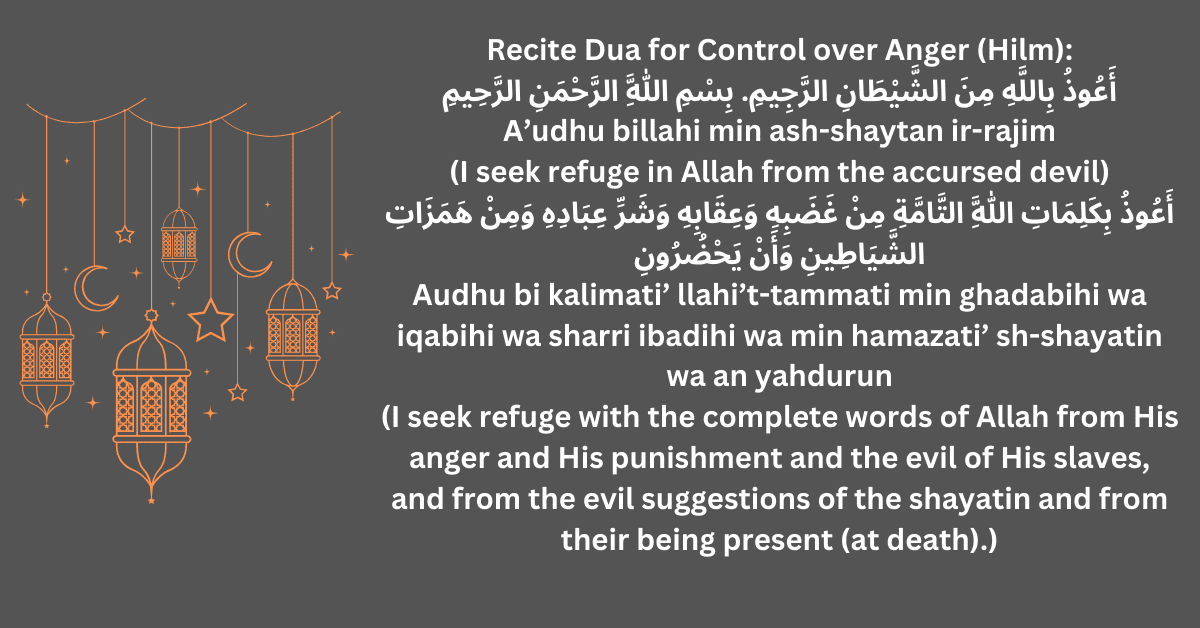Blog
Dua & Surah PDF
#duaforcontrollinganger, best dua for anger control, control anger, control your anger, controlling anger, controlling anger for kids, controllingyouranger, dua for anger, dua for anger control, dua for anger control in arabic, dua for controlling anger, dua for interrogation, dua to control anger, duaforanger, duasforangercontrol, how to control anger, innercalmandangercontrol, keystoangercontrol, wazifa for anger control
pdfislamicdua
0 Comments
Dua for Control over Anger (Hilm) in English
Dua for Control over Anger (Hilm) in English is a wonderful way to seek Allah’s help in staying patient and calm. This prayer helps you control your temper and act with kindness and understanding, following the teachings of the Prophet.
The Prophet (PBUH) said, “The strong is not the one who overcomes the people by his strength, but the strong is the one who controls himself while in anger.” (Sahih al-Bukhari 6114) He also said, “Whoever suppresses his anger, when he has the power to show it, Allah will raise him in high ranks on the Day of Resurrection.” (Sunan Ibn Majah 4186)
Recite Dua for Control over Anger (Hilm):
أَعُوذُ بِاللَّهِ مِنَ الشَّيْطَانِ الرَّجِيمِ. بِسْمِ اللَّهِ الرَّحْمَنِ الرَّحِيمِ
A’udhu billahi min ash-shaytan ir-rajim
(I seek refuge in Allah from the accursed devil)
أَعُوذُ بِكَلِمَاتِ اللَّهِ التَّامَّةِ مِنْ غَضَبِهِ وَعِقَابِهِ وَشَرِّ عِبَادِهِ وَمِنْ هَمَزَاتِ الشَّيَاطِينِ وَأَنْ يَحْضُرُونِ
Audhu bi kalimati’ llahi’t-tammati min ghadabihi wa iqabihi wa sharri ibadihi wa min hamazati’ sh-shayatin wa an yahdurun
(I seek refuge with the complete words of Allah from His anger and His punishment and the evil of His slaves, and from the evil suggestions of the shayatin and from their being present (at death).)
Dua for Guidance and Protection from Evil:
اللّهُمَّ إِنِّي أَسْأَلُكَ هُدَى وَالتُّقَى وَالعَفَافَ وَالغِنَى
Allahumma inni as’aluka al-huda, wat-tuqa, wal-‘afafa, wal-ghina
(O Allah! I ask You for guidance, piety, chastity, and self-sufficiency.)
Dua for Patience (Sabr):
رَبَّنَا أَفْرِغْ عَلَيْنَا صَبْراً وَثَبِّتْ أَقْدَامَنَا وَانصُرْنَا عَلَى القَوْمِ الكَافِرِينَ
Rabbana afrigh alayna sabran wa thabbit aqdamana wansurna alal-qawmil-kafirin
(Our Lord, pour upon us patience and plant firmly our feet and give us victory over the disbelieving people.)
(Surah Baqarah ayah 250)
What is HILM?
Hilm (حِلْم) in Islam means having patience and self-control, especially when you feel angry or upset. It is about staying calm and wise in difficult situations instead of reacting quickly or harshly.
Key Points About Hilm:
1. Self-Control: Hilm means controlling your anger, even when someone makes you mad.
2. Wisdom: A person with hilm thinks carefully before responding, rather than acting out of emotion.
3. Prophetic Trait: Prophet Muhammad (PBUH) was known for his hilm. For example, when people insulted him, he stayed calm and kind instead of getting angry.
Recent Posts
- Auzu Bikalimatillahi Tammati Min Sharri Ma Khalaq Meaning & Hadith
- Surah Alam Nashrah in English And Arabic
- Allahumma Inni Auzu Bika Min Sharri Sami – Meaning & Hadith
- Dua for Parenting -Patience, Pious offspring, Sabr
- Dua for Stability in Religion (Istiqamah) in Islam
How to Develop Hilm:
1. Be Patient: Try to pause before reacting when you’re upset.
2. Ask Allah for Help: Make dua for patience and self-control.
3. Forgive Others: Let go of anger and forgive those who wrong you.
Hilm is a valuable trait that helps you control your emotions, stay calm, and act wisely in tough situations.
How to Control Anger in Islam Dua?
In Islam, anger is seen as something that can lead to negative consequences if not managed properly. Some practical steps to control anger, as taught in the Islamic tradition, include:
1. Seek Refuge in Allah from Shaytan:
The Prophet (PBUH) taught that anger is from Shaytan (Satan). He advised saying:
“A’udhu billahi min ash-shaytan ir-rajim” (I seek refuge in Allah from the accursed devil) to calm down.
2. Change Your Position:
The Prophet (PBUH) said,
“If one of you becomes angry while standing, let him sit down. If the anger goes away (fine), otherwise let him lie down.” (Sunan Abi Dawud 4782)
3. Perform Ablution (Wudu):
The Prophet (PBUH) also recommended performing wudu when feeling angry, as anger is considered to be linked to the heat of Shaytan, and water helps calm it.
4. Stay Silent:
When angry, one should refrain from speaking, as speaking in anger can lead to harsh words or further escalation.
5. Practice Patience:
Controlling anger is linked to the concept of sabr (patience), which is highly praised in Islam. Allah says in the Quran,
“And those who restrain anger and pardon others—Allah loves the doers of good.” (Surah Al Imran 3:134)
Common Triggers of Anger and How to Avoid Them:
1. Pride and Ego: Pride or a sense of superiority can lead to anger when one’s ego is hurt. Islam encourages humility to prevent this.
2. Fatigue and Stress: Exhaustion can lower tolerance for frustration, leading to anger. Maintain balance, get enough rest, and practice self-care.
3. Provocation: Being in situations where one is deliberately provoked can trigger anger. Avoid environments or people who cause provocation.
4. Misunderstanding: Many conflicts arise from misunderstandings. Clear, honest communication can help prevent unnecessary disputes.
5. Shaytan’s Influence: Shaytan’s whispers can stir anger. Regularly seek Allah’s protection through dua and remembrance (dhikr) to guard against this.














Post Comment